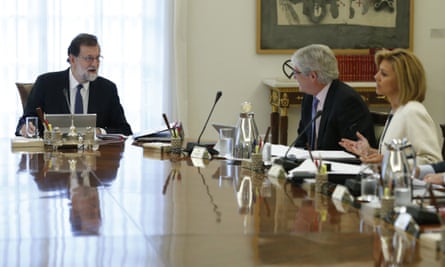The Spanish government has suspended Catalonia’s autonomy and will introduce direct rule from next Saturday as the country sinks further into its worst constitutional crisis since the restoration of democracy in 1977.
After an emergency cabinet meeting, and citing the Catalan government’s “conscious and systematic rebellion and disobedience”, Spain’s prime minister, Mariano Rajoy, said he was invoking article 155 of the constitution to “restore the rule of law, coexistence, the economic recovery and so that elections could be held in normal circumstances”.
Pending Senate approval next week, the government of Carles Puigdemont will be stripped of its powers, with its functions assumed by the relevant ministries in Madrid. Elections would then be held in Catalonia within six months, Rajoy said.
“We are not ending Catalan autonomy, but we are relieving of their duties those who have acted outside the law,” Rajoy said, without detailing which Catalan institutions would come under direct rule. It is expected that the interior ministry, and therefore the police, would be one.
Taxation and spending are also expected to be controlled by Madrid, but it is unclear whether the Spanish government will intervene in Catalan state media, whose outlets are viewed as the mouthpiece of the independence movement.
While the government insists that article 155 did not imply ending Catalan autonomy, many in the region are likely to take a different point of view. Thousands of demonstrators are expected to take to the streets later on Saturday to protest against the imposition of direct rule.
The deadline set by Madrid for Puigdemont to clarify whether he had, on 10 October, declared independence passed last Thursday. The Catalan president declined to answer yes or no and instead threatened to unilaterally declare independence if the government invoked article 155.

Spain’s attorney general said that if Puigdemont declared independence for Catalonia, he would be charged with “rebellion”, a crime that carries a maximum 30-year sentence. It was last used against the police and military who supported the failed coup in 1981.
As Rajoy’s People’s party has a majority in the Senate there is virtually no doubt that article 155 will be passed.
Puigdemont will then cease to be Catalan president, but he has a week’s grace during which he could stave off direct rule by calling elections. A poll published on Saturday morning showed that 68% of Catalans were in favour of this option.
However, polls also suggested Puigdemont’s party had not benefited from the rush to independence and would fail to get a majority. In recent days, all members of his coalition have said elections are not an option.
Meanwhile, the chances of the two sides sitting down to talk appear slim. One government spokesman said: “We’re not prepared to discuss the dismemberment of Spain and they don’t want to talk about anything else.”